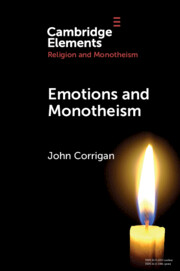Emotions and Monotheism
Published online by Cambridge University Press:
18 April 2024
- John Corrigan
- Affiliation:
Florida State University
Summary
The emotional turn in scholarship has changed the way in which historians of religion think about monotheistic traditions. New histories of religion have adapted and incorporated the totalizing sensibilities of twentieth century annalistes, the granular view of social historians, groundbreaking philosophical investigations, and the spirit of interdisciplinary collaboration between historical analysis, anthropology, and psychology. Religion as a principal bearer of culture has shaped emotional life profoundly, just as human emotion has constituted religious life. Taking a qualified constructivist approach to emotion enables understanding of the dynamism, fluidity, and ambiguity in emotional experience, alongside continuities, and facilitates analysis of how that feeling has animated religious life in monotheistic traditions. It equally sharpens insight into how monotheistic religion itself has made emotion. Affect, emotion, and mixed emotions are three categories of feelings evidenced in monotheistic religions. Each is illustrated with respect to the similarities and differences among Judaism, Christianity, and Islam.

